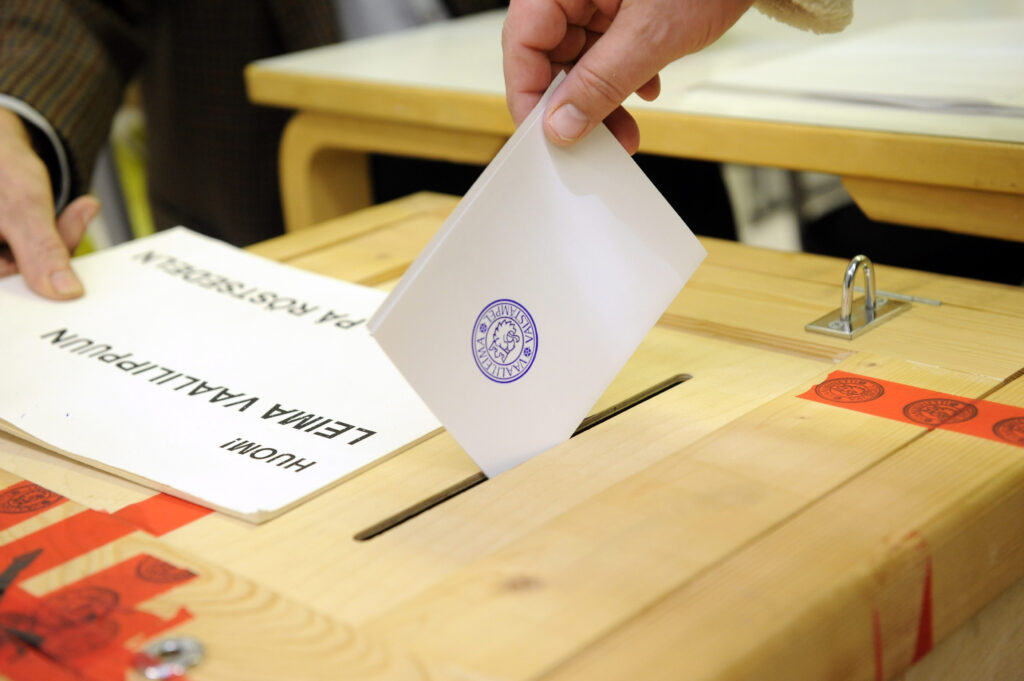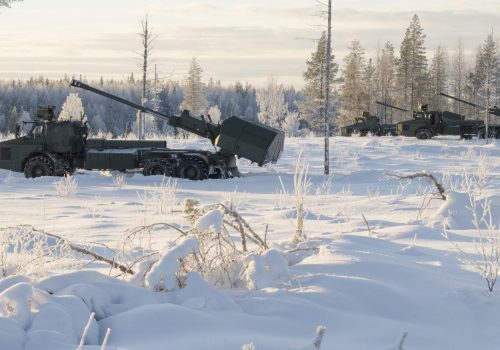After twelve years leading Finland, President Sauli Niinistö is wrapping up his second and final term, sending Finns to the polls on January 28. With a wide field of candidates—ranging from former ministers to political scientists—the election is likely to boil down to a runoff between two candidates. Currently, the ones leading in polls are former Prime Minister Alexander Stubb, former Minister of Foreign Affairs Pekka Haavisto, and Speaker of the Parliament Jussi Halla-aho.
Ahead of the election, the Europe Center is answering questions about the key candidates and issues at play.
What is the president’s role in Finland?
While the job is ceremonial in many ways (such as the president’s role in formally appointing the government), the president is a central figure in setting the course for Finland’s foreign and security policy—an unusual duty for many European heads of state. As such, Niinistö has played a key role in diplomacy with Russia and in securing Finland’s accession into NATO.
What is the political context?
With Russia’s war in Ukraine looming heavily in the background, this will be Finland’s first presidential election as a NATO member; that membership is supported by most of the population and all major presidential candidates. The outgoing and well-liked Niinistö, in office since 2012, will go down in history for overseeing this major shift in Finnish security posture, as well as for making limited progress towards much-lauded climate goals under Finland’s presidency of the Council of the European Union in 2019. The next president will likely pursue continuity in supporting Ukraine with military aid and countering Russian hybrid warfare along NATO’s border. In addition, the president will likely face pressure on tightening migration from the far-right Finns Party and the center-right National Coalition Party in parliament.
Who are the top candidates?
What do the leading candidates think about…
What impact might these elections have on Finland’s European orientation?
By percentage of gross domestic product (GDP), Finland is the seventh-largest donor to Ukraine among European Union (EU) countries, having allocated more than 2.3 billion euros in military, humanitarian, and development assistance. In 2022, it spent 1.6 percent of its budget on military expenditures, ranking tenth among EU countries. Finland’s $59,470 GDP per capita was the ninth highest in the EU, and it is the eighth-largest contributor to the EU’s annual budget. In other words, Finland is statistically a significant contributor to the EU and European security, both directly and indirectly, and its continued support for Euro-Atlantic institutions is critical.
Luckily, there is wide consensus among the leading candidates that Finland must continue to play a role in both the EU and NATO. Among top candidates, only Halla-aho, who is polling at around 18 percent, supports Finland’s exit from the EU (or “Fixit”), though he’s tried to walk back comments, saying Fixit should be Finland’s long-term goal but it isn’t possible in the near future. With the election likely boiling down to Haavisto and Stubb, Finnish support for the EU, NATO, and Ukraine seems set despite the rise of a Euroskeptic Halla-aho—an important win for Europe as it seeks to push back Russian aggression on its eastern frontier.
—Emma Nix is an assistant director at the Europe Center
How might a change in Finnish leadership alter the political dynamics at play in Northern Europe?
Under Niinistö’s presidency, Finland became a NATO member on April 4 last year, leading to a renewed focus on the country’s security situation. The upcoming Finnish election holds critical implications for Finland’s role in NATO, its stance against Russia, and its support for Ukraine. The new president will have to navigate questions about Finland’s role and significance within the alliance. Key responsibilities include finding a balance within NATO structures and making essential adjustments on military and societal fronts.
All candidates express a consensus on the pressing security issues stemming from Russia’s aggression and the need for ongoing and strong military, political, and economic support to Ukraine. The emphasis is on avoiding conveying a sense of expecting a Ukrainian defeat and, instead, maintaining optimism and clear objectives for effective support. The candidates agree on the need for substantial, long-term support to Ukraine, as well as on serving as a motivator to encourage other states to continue their assistance. The shared objective is to defeat Russia and actively pursue a just and sustainable peace, emphasizing security guarantees and enduring support for Ukraine, as long as needed. No candidate questions Finland’s membership in NATO. Finland’s commitment to supporting Ukraine and its NATO position holds significance not only for Finland but also for Sweden and NATO as a whole.
The collaboration between Sweden and Finland has evolved into a well-established concept, with ongoing efforts to build an integrated air defense system and commitments to regional defense collaboration, including joint operational planning and operations in the High North. The recent accession of Sweden and Finland to NATO adds security to the High North and Baltic Sea Region, with broader implications for the Alliance as a whole. As a strategic entity, Finland’s and Sweden’s contributions play a vital role in strengthening defense and deterrence, and addressing emerging challenges in the region, including technological advancements and Russia’s actions. Within the framework of existing and emerging security challenges, it is important that Sweden and Finland maintain, continue, and deepen their collaboration, as the candidates’ consensus on key issues seems to signal.”
—Anna Wieslander is the Europe Center’s Northern Europe Office director, and Louise Blomqvist is a project assistant with the Northern Europe Office
Related reading

The Europe Center promotes leadership, strategies, and analysis to ensure a strong, ambitious, and forward-looking transatlantic relationship.
Emma Nix is an assistant director at the Europe Center.
Sophia Athan and Stuart Jones are Young Global Professionals at the Europe Center.
Image: Voters cast their ballots at a school in Espoo January 22, 2012. Voters went to the polls on Sunday in Finland's first round presidential elections. REUTERS/Lehtikuva/Mikko Stig (FINLAND - Tags: POLITICS ELECTIONS) THIS IMAGE HAS BEEN SUPPLIED BY A THIRD PARTY. IT IS DISTRIBUTED, EXACTLY AS RECEIVED BY REUTERS, AS A SERVICE TO CLIENTS. NO THIRD PARTY SALES. NOT FOR USE BY REUTERS THIRD PARTY DISTRIBUTORS. FINLAND OUT. NO COMMERCIAL OR EDITORIAL SALES IN FINLAND

